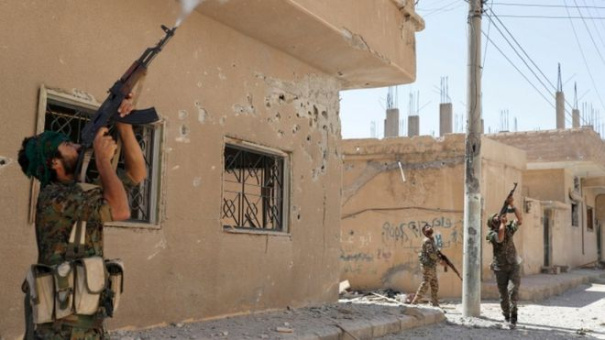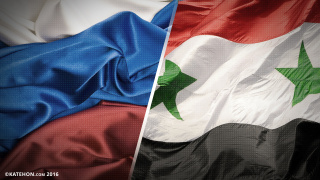Kurds in Syria suffer the greatest defeat
The US leadership continues to comment on its sensational decision of the end of last year - to withdraw American troops from Syria. This decision will affect not only the US position. No less important is the fact that the United States, in fact, betrayed its closest allies in Syria - the Kurds. What fate awaits the Syrian Kurds now and what concessions will they have to make to Damascus?
The Arab newspaper Ash-Sharq al-Awsat reported that the Kurds had offered a settlement plan to Moscow and Damascus. It involves the transfer of control over the north-east to the Syrian authorities in exchange for recognition of the Kurds' right to self-government. In parallel, the Assad troops must ensure the protection of the Syrian-Turkish border, that is, the security of the Kurdish population. According to the newspaper, Russia, in turn, will act as a guarantor of this agreement.
How the Kurds intensified
Before the beginning of the civil war in Syria, the Kurds were not in good condition. For decades they suffered from harassment from Assad, and even earlier - from his father. Many were deprived of citizenship and the right to private property. Some were driven into the desert (this is how the territories for the Arabs were freed up). Kurdish publications were banned, and the teaching of the national language was banned in schools.
Paradoxically, the civil war gave the Kurds a chance. Over time, the Kurds have become stronger. Such important cities as Manbij, Afrin, Hasaka, Rakka, Tabka, and Tell-Rifat turned out to be under their control or influence.
The Kurds have indeed intensified. It seemed that they would not leave the natural range of their existence and would limit themselves only to the protection of Kurdish areas. However, the appetite, as you know, comes with eating. Gradually, their influence began to be felt in the provinces of Aleppo and Deir ez-Zor. Moreover, the Kurds have made a significant contribution to the defeat of the IG terrorists and suffered greatly from the Sunni radicals. They had a reason, justification and support. First, the combat units created security zones around the Kurds. Secondly, they trivialized revenge for 2014, while the radicals staged reprisals against the Kurdish population. During the massacre in Kobani, the young son of the leader of the Syrian Kurds was killed.
American troops, that is, about 2,000 military advisers and marines, are currently stationed, including on the territory of Syrian Kurdistan. We are talking about the province of Hasaka in the northeast. Over time, the Americans created there at least two military bases. American instructors and advisers received the most modern weapons and equipment, which they transmitted, including to the Kurds. They trained and trained Kurdish fighters. Over time, the Kurdish SDF / YPG units became a serious player and expanded their territories to the south, west and north, up to the Syrian-Turkish border. The Kurds have made a significant contribution to the liberation of the Syrian capital Raqqa from an Islamic state. Now this city, and in general, some of the province of the same name is under the control of Kurdish units.
Extensive territory the size of an average European state began to be controlled by local paramilitary forces. Administrations were created, local elections were held, district and settlement managers were appointed. Someone even said that the Kurds are conducting a public experiment and create a society using Murray Bukchin's patterns. The American sociologist was known for his radical left-wing social and anarchist views. The Kurds gave special powers to the rural communes and local governments at the micro level. Many important managerial positions were given to women. In 2016, it was announced the creation of a federation called Rozhava. The fourth largest people of the Middle East went to a wide autonomy.
It angered many. Naturally, Damascus saw this as separatism on an ethnic basis. Antagonism intensified mutual historical and anthropological hostility of the Arabs and Kurds.
In the summer of 2018, the Kurds conducted intensive negotiations with Damascus. The latter demanded strong easing of autonomy and access to oil facilities in the northeast (they were under the control of the Kurds). Negotiations have failed. It seemed to Kurds that Assad demands too much. Moreover, there was not even a hint that the Americans could leave Syria.
I did not like it Russian and Iranians. Moscow and Tehran relied on Damascus, saw in the official authorities the main and only ally, able to control the entire territory of Syria.
The Iranian motives are clear: the history and dislike of the Shiites for the Kurds. It is much harder to assess the Russian policy in the Kurdish direction. A few years ago, Moscow refused to support the Kurds. A solid delegation of Kurds led by their leader Salih Muslim came to Moscow. It is noteworthy that this happened before the serious contacts of the Kurds with the Americans.
Of course, Russia's refusal was primarily justified by energy and economic factors. Moscow in every way seeks to complete the construction of gas lines to Europe, and trade relations with solid Turkey should not be written off. In short, Russia made a decision. The correctness of this decision from the point of view of geopolitics (everything is clear with the economy) can be judged over time.
In other words, everyone “left” the Syrian Kurds. That is all. The last were the Americans. However, their actions will be the most painful for the Kurdish people.
Turkey's interest
Where the danger for the Kurds can come from is not a serious question, since the answer to it is obvious. Of course, Turkey views the Kurds in the south, on the other side of the Turkish-Syrian border, as a threat to national security. In turn, Kurdish nationalism, the desire of this people to create a state center is an existential threat to Turkish statehood. Ankara fears the growing Kurdish factor, considering the Kurds of Syria as terrorists.
In short, there is reason to believe that the Turkish army or at least the pro-Turkish groups, with the support of Ankara, can launch an offensive on the border cities in order to push the Kurds deeper into Syria. There is one more scenario: the airstrikes of the Turkish Air Force to the key logistics and infrastructure positions of the Kurds in the northeast.
Turkey was in a difficult situation. It can not be inactive. The very deep faith of Turkish strategists in the danger posed by the Kurds. The Minister of Defense of Turkey celebrated the new year on the border with Syria, saying that he would not allow the threat from terrorists.
Kurds will have to make concessions
So what will the withdrawal of Americans from Syria for Kurds?
The withdrawal of American troops is in any case not easy. According to various estimates, this process will take about four months. In addition, the head of the Oval Office stressed that Washington will continue to defend the Kurds in Syria.
The outcome is already close, and, most likely, in a few months it will become clear where the Kurds will turn. Most likely, the turn will be in the direction of Damascus. This is probably the lesser of evils ... The Kurds have already ceded control of Manbidge to Damascus - and they will have to make further concessions. Give the Arab areas that are the security zone of the territory of the Kurds. Damascus also has long required the integration of part of the Kurdish fighters in the regular Syrian army. And finally, access to the main thing - to oil in the northeast.



